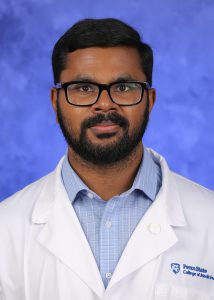MD/PhD student wins prestigious NIH fellowship in bioinformatics and genomics
Havell Markus, an MD/PhD student at Penn State College of Medicine and a past trainee of the Huck Institutes of the Life Sciences’ Computation, Bioinformatics, and Statistics (CBIOS) training program, has been awarded the NIH F30 Ruth L. Kirschstein National Research Service Award Individual Predoctoral MD/PhD Fellowship Award by the National Institute of General Medical Sciences.
His funded research and thesis proposal titled “Genetic regulation of genes on active and inactive X chromosome and their contribution to sex-biased diseases” is co-mentored by Dajiang Liu, PhD, and Laura Carrel, PhD.
The proposed research will seek a better understanding of how our DNA influence the risk of developing autoimmune diseases such as lupus, rheumatoid arthritis and type 1 diabetes. Autoimmune diseases affect nearly 10 percent of the world populations and often have no cure. In their advanced stages, these diseases cause substantial morbidity and mortality and significantly reduce the quality of life.
At a basic level, the immune system is designed to defend the body against harmful invaders like bacteria, viruses and other pathogens. However, in autoimmune diseases, the immune system mistakenly recognizes some parts of the body’s own tissues as foreign and begins to attack them. This misdirected immune response can cause damage to various body tissues and cause autoimmune diseases. A most notable feature of autoimmune disease is sex bias, where females are disproportionally affected.
“My research lies at the intersection of biology, medicine, statistics and machine learning, and seeks to understand what causes sex differences,” said Markus.
Housing over 100 immune related genes, the human X chromosome is one of the two sex chromosomes involved in sex determination. Females have two copies of the X chromosome while males only have one. When the chromosome is activated, genes on the X chromosome will be transcribed to RNA and then translated to protein and influence various health and disease outcomes. In females, one copy of the X chromosome is often inactivated [X chromosome inactivation (XCI)] to maintain gene dosage with males; yet some genes escape this silencing mechanism and express from both X chromosomes, leading to a higher gene expression in females than males. This could potentially cause diseases with sex bias.
“In this project, we will develop two novel statistical and machine learning methods to identify genes that escape X chromosome inactivation across human tissues and characterize whether DNA variations influence how likely a gene will escape XCI,” Markus said.
“With these powerful computational tools, we will, for the first time, systematically characterize how genes on the X chromosome in various human organs will contribute to human diseases, in particular for disease with a sex bias,” Liu added.
The success of Markus’s proposal not only comes from his sponsors and co-sponsors, but also from support provided by the College of Medicine’s MD/PhD Medical Scientist Training Program (MSTP) and through the training he received from the CBIOS program.
“We are excited about Havell’s work to address this significant health issue. With the rising interest and promise offered by big data and artificial intelligence (AI) in biomedical sciences and health care, we have made AI a key part of the strategic plan of the College of Medicine,” said Leslie Parent, MD, vice dean of research and graduate studies and co-lead of the MSTP. “Computationally savvy physician-scientists can bridge the gap between medicine and basic biomedical and computational sciences, accelerating discovery, and leading to delivery of high-quality patient care.”
Being part of computational and experimental labs led by Liu and Carrel, Markus will have the unique opportunity to learn about and formulate creative and novel solutions for biomedical problems. As a first-generation college student and aspiring physician-scientist, Markus hopes to direct his own lab in the future and translate his findings in research to improve patient outcomes.
If you're having trouble accessing this content, or would like it in another format, please email Penn State Health Marketing & Communications.

